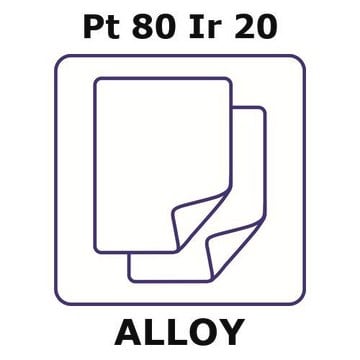GF07844249
Ruthenium
Ruthenium, foil, 10x10mm, thickness 1.0mm, 99.9%
Synonym(s):
Ruthenium, RU000220
Sign Into View Organizational & Contract Pricing
All Photos(2)
About This Item
Empirical Formula (Hill Notation):
Ru
CAS Number:
Molecular Weight:
101.07
MDL number:
UNSPSC Code:
12141739
PubChem Substance ID:
NACRES:
NA.23
Recommended Products
Assay
99.9%
form
foil
manufacturer/tradename
Goodfellow 078-442-49
resistivity
7.1 μΩ-cm, 0°C
L × W × thickness
10 mm × 10 mm × 1.0 mm
bp
3900 °C (lit.)
mp
2310 °C (lit.)
density
12.45 g/cm3 (lit.)
SMILES string
[Ru]
InChI
1S/Ru
InChI key
KJTLSVCANCCWHF-UHFFFAOYSA-N
Looking for similar products? Visit Product Comparison Guide
General description
For updated SDS information please visit www.goodfellow.com.
Legal Information
Product of Goodfellow
Storage Class Code
13 - Non Combustible Solids
WGK
nwg
Flash Point(F)
Not applicable
Flash Point(C)
Not applicable
Certificates of Analysis (COA)
Search for Certificates of Analysis (COA) by entering the products Lot/Batch Number. Lot and Batch Numbers can be found on a product’s label following the words ‘Lot’ or ‘Batch’.
Already Own This Product?
Find documentation for the products that you have recently purchased in the Document Library.
Kay Severin
Chimia, 66(6), 386-388 (2012-08-09)
Certain ruthenium complexes are potent catalysts for atom transfer radical addition (ATRA) and cyclization (ATRC) reactions, in particular if they are used in conjunction with reducing agents such as magnesium. This short overview summarizes recent developments in this area with
Martin R Gill et al.
Chemical Society reviews, 41(8), 3179-3192 (2012-02-09)
In the last few decades, coordination complexes based on d(6) metal centres and polypyridyl ligand architectures been developed as structure- and site-specific reversible DNA binding agents. Due to their attractive photophysical properties, much of this research has focused on complexes
E Tfouni et al.
Current medicinal chemistry, 17(31), 3643-3657 (2010-09-18)
The discovery of the involvement of nitric oxide (NO) in several physiological and pathophysiological processes launched a spectacular increase in studies in areas such as chemistry, biochemistry, and pharmacology. As a consequence, the development of NO donors or scavengers for
Aviva Levina et al.
Metallomics : integrated biometal science, 1(6), 458-470 (2009-11-01)
Interest in Ru anticancer drugs has been growing rapidly since NAMI-A ((ImH(+))[Ru(III)Cl(4)(Im)(S-dmso)], where Im = imidazole and S-dmso = S-bound dimethylsulfoxide) or KP1019 ((IndH(+))[Ru(III)Cl(4)(Ind)(2)], where Ind = indazole) have successfully completed phase I clinical trials and an array of other
A Bergamo et al.
Journal of inorganic biochemistry, 106(1), 90-99 (2011-11-25)
The study of metal complexes for the treatment of cancer diseases has resulted in the identification of some unique properties of ruthenium-based compounds. Among these inorganic-based agents, two of them, namely the ruthenium(III) drugs NAMI-A and KP1019 have undertaken with
Our team of scientists has experience in all areas of research including Life Science, Material Science, Chemical Synthesis, Chromatography, Analytical and many others.
Contact Technical Service





